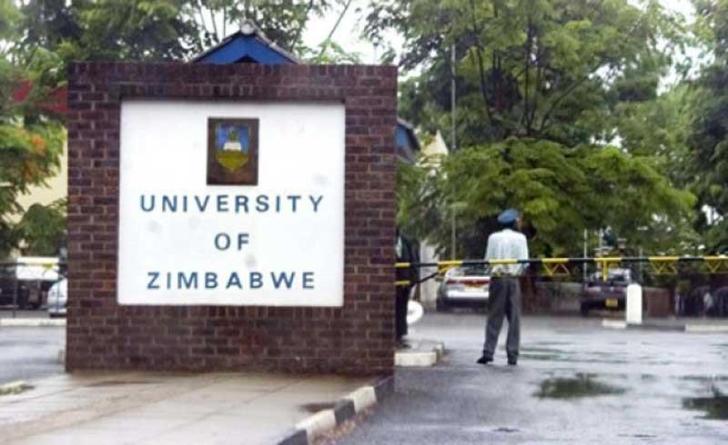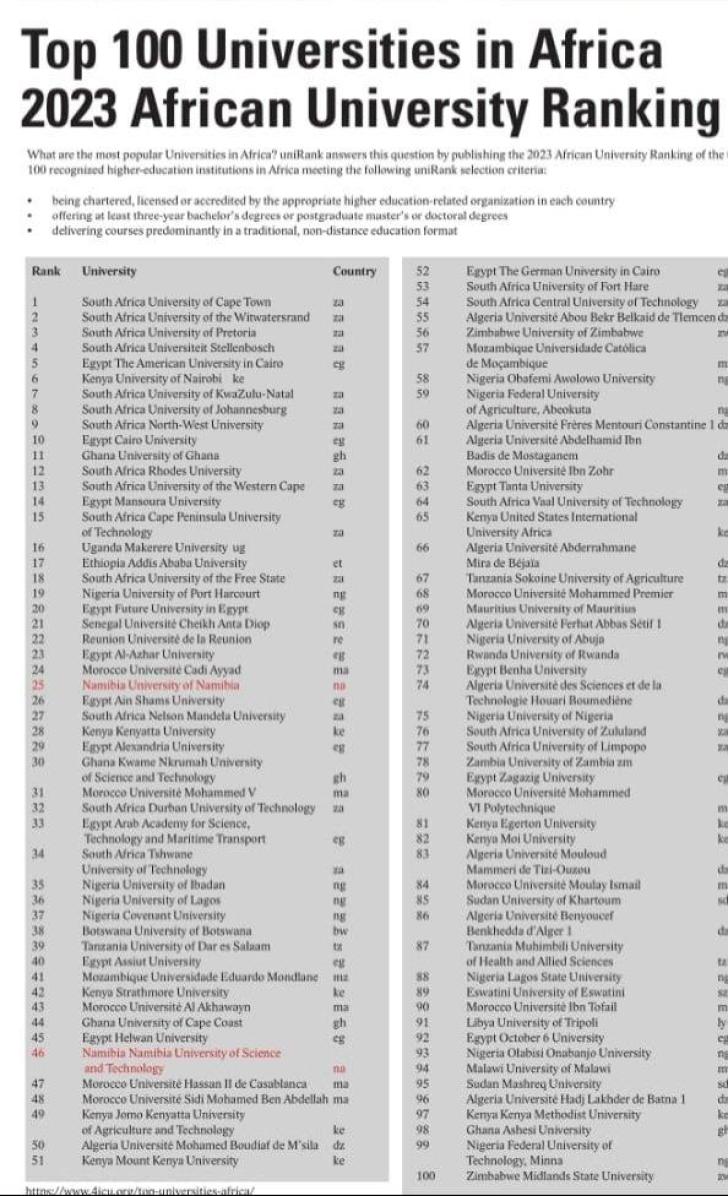News / National
Zimbabwe varsities lowly ranked on uniRank 2023
12 Jan 2024 at 08:25hrs |
0 Views

Zimbabwe’s citadel of higher learning - the University of Zimbabwe (UZ) - continues to languish in the bottom half of the Top 100 best universities in Africa, according to uniRank 2023.
It is not clear how the rankings are conducted but this reflects Zimbabwe's current precipitous deterioration in the quality of education due to the prolonged political and socio-economic crisis, particularly after 2000.
UZ is now ranked 56 out of 100 best universities in Africa, a very poor performance given that it used to be in the Top 25 where the University of Namibia currently is.
The Midlands State University in Gweru is ranked 100, the last on the list of the best universities in Africa.
Due to perennial underfunding, which is common across the sector, the National University of Science and Technology (NUST) in Bulawayo is not even there.
But it is generally considered the second-best university in Zimbabwe after UZ.
By contrast, South Africa continues to dominate the rankings across the continent with seven out of the Top 10 best universities in Africa.
South Africa's University of Cape Town remains at the top at N0.1.
Besides South Africa, Namibia and Botswana are now doing better than Zimbabwe in the region on university rankings.
The most important matrices in the rankings are teaching (the learning environment); research (quantitative, income and reputation); research quality (citation impact, research strength, excellence and influence); international best practices/outlook (staff, students and research); and industry (income and patents).
Zimbabwe now finds itself in a paradoxical situation: it has one of the highest literacy rates in Africa at about 90%, but its universities perform dismally in both continental and international rankings.
UZ is the country’s flagship university founded in 1952 as the University College of Rhodesia and Nyasaland.
It was initially affiliated with the University of London.
Later it was renamed the University of Rhodesia and adopted its present name upon Zimbabwe's independence in 1980.
Before Zimbabwe's economic collapse and national failure, UZ used to be a prestigious institution, but it has now long lost its spot among the elite league of African universities.
Zimbabwe’s education is trapped in a multifaceted crisis exacerbated by the economic situation.
The government has cut spending on public education; parents are severely incapacitated in funding their children’s education; teachers or lecturers are underpaid and face political repression when they demand better salaries and working conditions.
This has also caused another damaging development: brain drain on a massive scale.
The government’s response to the education crisis has been weak, without strategy and resources, and overwhelmingly ineffective, thus ensuring continued deterioration of the standards and quality of education in the country, with far-reaching economic and development consequences.

It is not clear how the rankings are conducted but this reflects Zimbabwe's current precipitous deterioration in the quality of education due to the prolonged political and socio-economic crisis, particularly after 2000.
UZ is now ranked 56 out of 100 best universities in Africa, a very poor performance given that it used to be in the Top 25 where the University of Namibia currently is.
The Midlands State University in Gweru is ranked 100, the last on the list of the best universities in Africa.
Due to perennial underfunding, which is common across the sector, the National University of Science and Technology (NUST) in Bulawayo is not even there.
But it is generally considered the second-best university in Zimbabwe after UZ.
By contrast, South Africa continues to dominate the rankings across the continent with seven out of the Top 10 best universities in Africa.
South Africa's University of Cape Town remains at the top at N0.1.
Besides South Africa, Namibia and Botswana are now doing better than Zimbabwe in the region on university rankings.
The most important matrices in the rankings are teaching (the learning environment); research (quantitative, income and reputation); research quality (citation impact, research strength, excellence and influence); international best practices/outlook (staff, students and research); and industry (income and patents).
Zimbabwe now finds itself in a paradoxical situation: it has one of the highest literacy rates in Africa at about 90%, but its universities perform dismally in both continental and international rankings.
UZ is the country’s flagship university founded in 1952 as the University College of Rhodesia and Nyasaland.
It was initially affiliated with the University of London.
Later it was renamed the University of Rhodesia and adopted its present name upon Zimbabwe's independence in 1980.
Before Zimbabwe's economic collapse and national failure, UZ used to be a prestigious institution, but it has now long lost its spot among the elite league of African universities.
Zimbabwe’s education is trapped in a multifaceted crisis exacerbated by the economic situation.
The government has cut spending on public education; parents are severely incapacitated in funding their children’s education; teachers or lecturers are underpaid and face political repression when they demand better salaries and working conditions.
This has also caused another damaging development: brain drain on a massive scale.
The government’s response to the education crisis has been weak, without strategy and resources, and overwhelmingly ineffective, thus ensuring continued deterioration of the standards and quality of education in the country, with far-reaching economic and development consequences.

Source - newshawks
Join the discussion
Loading comments…




























